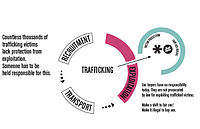
Photo from wikipedia
Child sex trafficking (CST), the unlawful recruitment of any minor to engage in commercial sexual exploitation through force, fraud, or coercion, is a growing epidemic worldwide. Sex trafficking can have… Click to show full abstract
Child sex trafficking (CST), the unlawful recruitment of any minor to engage in commercial sexual exploitation through force, fraud, or coercion, is a growing epidemic worldwide. Sex trafficking can have devastating consequences for children, including long-lasting physical and psychological trauma. Counselors working in clinical and school settings have first-hand access to a number of at-risk populations due to the nature of their work. Yet, counselors in the United States report lack of training on CST as a limitation to their ability to identify and effectively work with CST victims. Limited training derives from the absence of competency standards to guide counselors working with CST victims. To address this critical gap, this research study utilized expert consensus to develop an initial list of CST competencies for counselors working in the United States. A heterogeneous sample of 19-CST experts participated in a four-round Delphi process. The expert panel reached a consensus on 128 CST competency statements organized into five domains: (a) intervention strategies and the helping relationship, (b) trauma and sex trafficking, (c) assessment of risk factors and indicators, (d) ethical practice, and (e) cultural diversity and human growth and development. This article assists in identifying standards of practice necessary for counselors to detect, prevent, and assist sex-trafficked youth. Creating an initial list of competency standards can serve as guiding points for clinical practice training curricula, and quality control assessments for counselors, and possibly other mental health professionals, working with CST.
Journal Title: Journal of Interpersonal Violence
Year Published: 2022
Link to full text (if available)
Share on Social Media: Sign Up to like & get
recommendations!